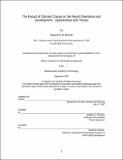| dc.contributor.advisor | William C. Wheaton. | en_US |
| dc.contributor.author | McGill, Daniel D. D. (Daniel Dulany deButts) | en_US |
| dc.contributor.other | Massachusetts Institute of Technology. Dept. of Urban Studies and Planning. | en_US |
| dc.date.accessioned | 2008-09-02T17:49:44Z | |
| dc.date.available | 2008-09-02T17:49:44Z | |
| dc.date.issued | 2007 | en_US |
| dc.identifier.uri | http://hdl.handle.net/1721.1/42018 | |
| dc.description | Thesis (S.M. in Real Estate Development)--Massachusetts Institute of Technology, Dept. of Urban Studies and Planning, 2007. | en_US |
| dc.description | This electronic version was submitted by the student author. The certified thesis is available in the Institute Archives and Special Collections. | en_US |
| dc.description | "September 2007." | en_US |
| dc.description | Includes bibliographical references (leaves 54-58). | en_US |
| dc.description.abstract | This thesis serves as a pedagogical guide to the ski resort industry, and presents a broad overview of the unique issues that accompany climate change. The paper also provides recommendations to resort developers as to which regions of North America will likely become desirable destination for skiers in light of such changes. The ski resort industry is on the cutting edge with respect to sustainable building techniques and adoption of innovative "green" principles in day-to-day operations. But while these efforts are admirable and set an important precedent, in the global context they do little to stem the tide of global warming which penalizes indiscriminately. It is therefore necessary for stakeholders within the ski industry to not only embrace adoption strategies, but also to consider what preemptive actions can be taken to capitalize on global warming. Using historical annual total snowfall records and "skier visit" data, this study intends to quantify the extent to which climate change has impacted resort operations in different regions of the United States over the last several decades. In addition, the paper provides an overview of current and future effects of climate change on North America's ski resort industry and provides recommendations as to how these operators can adapt to ever changing conditions over the next 30 - 50 years. This is followed by a review of climate adaptation practices currently employed by resort operators and stakeholders. With few exceptions, existing literature on this topic has neglected to consider what opportunities might emerge as a result of climate change. While the field of climatology is an ever evolving science, the ski industry would be wise to take note as global warming is likely to prove one of those tectonic forces that gradually - but powerfully - changes the economic landscape in which they operate. | en_US |
| dc.description.statementofresponsibility | by Daniel D.D. McGill. | en_US |
| dc.format.extent | 58 leaves | en_US |
| dc.language.iso | eng | en_US |
| dc.publisher | Massachusetts Institute of Technology | en_US |
| dc.rights | M.I.T. theses are protected by
copyright. They may be viewed from this source for any purpose, but
reproduction or distribution in any format is prohibited without written
permission. See provided URL for inquiries about permission. | en_US |
| dc.rights.uri | http://dspace.mit.edu/handle/1721.1/7582 | en_US |
| dc.subject | Urban Studies and Planning. | en_US |
| dc.title | The impact of climate change on ski resort operations and development : opportunities and threats | en_US |
| dc.type | Thesis | en_US |
| dc.description.degree | S.M.in Real Estate Development | en_US |
| dc.contributor.department | Massachusetts Institute of Technology. Department of Urban Studies and Planning | |
| dc.identifier.oclc | 226339450 | en_US |
